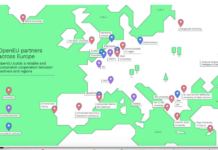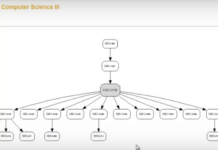
Republic of South Africa (2013) White paper for Post-School Education and Training Pretoria SA: Department of Higher Education and Training
Makhanya, M. (2014) Discussion of the launch of the new White Paper of Higher Education Pretoria: UNISA
The International Council for Distance Education’s recent newsletter draws attention to the South African government’s white paper on post-secondary education and the implications for open and distance education in South Africa, and also reports on the response of Professor Mandla Makhanya, the Principal and Vice Chancellor of the University of South Africa (UNISA), which up to now has been almost the sole provider of open and distance education at university level in South Africa.
I attempt to give a very brief summary of the main points, with a focus on open and distance education and online learning, but really the paper should be read in full if you have any interest in post-secondary education in South Africa, since it contains many facts and figures about current practices as well as plans for future development.
What the government White Paper says
The paper’s scope
The paper is concerned about what we in Canada would call post-secondary education as a whole, which South Africa’s Department of Higher Education and Training (DHET) defines as follows:
all education and training provision for those who have completed school, those who did not complete their schooling, and those who never attended school. It consists of the following institutions, which fall under the purview of the DHET:
- 23 public universities (with two more being established in 2014);
- 50 public technical and vocational education and training (TVET) colleges (formerly known as further education and training [FET] colleges);
- public adult learning centres (soon to be absorbed into the new community colleges);
- private post-school institutions (registered private FET colleges and private higher education institutions, also to be renamed TVET colleges);
- the SETAs and the National Skills Fund (NSF);
- regulatory bodies responsible for qualifications and quality assurance in the post-school system – the South African Qualifications Authority (SAQA) and the Quality Councils.
Main policy objectives:
- a post-school system that can assist in building a fair, equitable, non-racial, non-sexist and democratic South Africa;
- a single, coordinated post-school education and training system;
- expanded access, improved quality and increased diversity of provision;
- a stronger and more cooperative relationship between education and training institutions and the workplace;
- a post-school education and training system that is responsive to the needs of individual citizens and of employers in both public and private sectors, as well as broader societal and developmental objectives.
Main priorities
- Technical and vocational education: The DHET’s highest priority is to strengthen and expand the public TVET colleges and turn them into attractive institutions of choice for school leavers. Targeted enrollment:
- 2010: 345,000
- 2013: 650,000
- 2015: 1 million
- 2030: 2.5 million
2. University education: In this sector DHET’s focus is on promoting the improvement of quality and building appropriate diversity…South Africa needs a diverse university sector which is purposefully differentiated.
Targeted enrollment:
- 2011: 937,000 students (17.3% participation rate)
- 2030: 1,600,000 (25% participation rate)
As participation increases, universities must simultaneously focus their attention on improving student performance. Improving student access, success and throughput rates is a very serious challenge for the university sector and must become a priority focus for national
policy and for the institutions themselves….The DHET remains committed to progressively introducing free education for the poor in South African universities as resources become available.
3. Open learning: The DHET will work toward creating a post-school distance education landscape based on open learning principles. This landscape will complement the traditional campus-based provision. It will consist of a network of education providers supported by learning support centres and/or connectivity for students. Such a network will make available a wide range of learning opportunities to potential students that are closer to their homes and at times appropriate to their contexts. Other advantages include the development and availability of well-researched, high-quality national learning resources (made available as open education resources [OER]), collaborative development of learning resources, more efficient use of existing infrastructure, and an increasing emphasis on independent study as preparation for subsequent lifelong learning
4. Distance education and online learning: Universities…will be encouraged to expand distance higher education for vocationally oriented diploma programmes. Presently, this area is less developed than distance education for the purely academic programmes. The Department will also encourage all universities to expand online and blended learning as a way to offer niche programmes.
The Department will seriously investigate the possibility of providing distance education programmes at the TVET and community college level, including dedicated staff and equipment. The theoretical component of apprenticeships might also be offered through
distance education.
What do these policy changes mean for UNISA?
UNISA’s HQ, Pretoria
The White paper is likely to mean significant changes for UNISA, which has had until now a unique status as South Africa’s national open university. Three key concerns identified by Professor Makhanya are:
- UNISA stands to lose students regionally, to those universities who provide ODeL courses, and where there is a perception that both the service and the quality of the course will be better than that which UNISA currently offers.
- UNISA needs to safeguard against the uptake of our courses by new ODeL providers, as this poses the risk of the bleeding of our intellectual capital out of the institution at our expense
- UNISA runs the very real risk of losing good, experienced staff to institutions that are embarking on ODL provision.
This presents a particular challenge for UNISA:
Now more than ever before, Unisa will have to raise the bar by improving on the quality of its offerings; the levels of its service; its throughput and success rates; and most importantly the calibre of its graduates.
However, as Professor Makhanya argues, UNISA has one main advantage:
MOOCs, OER and other innovative and potentially useful technologies have recognised and acknowledged quality assurance as their greatest stumbling block …. UNISA is very fortunate that ODL is an accepted component of South Africa’s HE system, which is quality assured. Few other ODL providers, especially those in the developing nations can make that claim.
Clearly UNISA intends to act as a standard bearer for high quality in open and distance learning in South Africa.
Comment
First the South African government’s white paper seems to me a very good plan for the future. It sets priorities and targets, and relates the plan to the current external economic and political environment. It sets out an impressively idealist set of values for South African post-secondary education, based on equality between races and genders, access to all, and academic freedom within an overarching framework of public accountability. It recognizes that online and distance education are now an integral part of the work of post-secondary institutions. This will help promote further acceptance of these methods into the mainstream.
At the same time, Professor Makhanya in her paper provides a strong dose of reality:
The present picture of South African higher education is a bleak one [Often global and dynamic trends that affect South Africa are]:
1. the ongoing global recession that has exacerbated … national socio-economic and political woes;
2. the potential and pitfalls of technological innovation;
3. the growing phenomenon of internationalisation with the attendant commercialisation of education; ….crises of leadership and management;
4. relentless calls for (free) access against a backdrop of widespread poverty;
5. concerns about the quality and relevance of our qualifications;
6. unsatisfactory levels of student support;
7. the changing nature of the academic and the academe;
8. the calibre and preparedness for work/professions of the graduates that we produce; and
9. serious deficits in terms of access to the internet in South Africa
In particular: Approximately three million young people between the ages of 18 and 24 (that number is now estimated to be closer to 5 million) are not accommodated in either the education and training system or the labour market.
It therefore seems to me that UNISA’s role will remain critical for the future development of South Africa. It fears it may become seen as the ‘university of the last resort’ if it has to go into direct competition with more traditional universities. Since those likely to be seeking a last resort in South Africa are likely to remain in the millions into the foreseeable future, UNISA would still provide a critically important role as such a last resort, so long as its students can get the education and qualifications that will meet the needs of South African society.
Perhaps more importantly, I believe that in the future, the quality of teaching and learning, not research reputation, will be the strongest differentiator between post-secondary institutions, in terms of student choice, and UNISA has the chance to establish itself as a leader in South Africa on the ‘quality of teaching’ criterion – much as the UK Open University has done in Britain.











 Dr. Tony Bates is the author of eleven books in the field of online learning and distance education. He has provided consulting services specializing in training in the planning and management of online learning and distance education, working with over 40 organizations in 25 countries. Tony is a Research Associate with Contact North | Contact Nord, Ontario’s Distance Education & Training Network.
Dr. Tony Bates is the author of eleven books in the field of online learning and distance education. He has provided consulting services specializing in training in the planning and management of online learning and distance education, working with over 40 organizations in 25 countries. Tony is a Research Associate with Contact North | Contact Nord, Ontario’s Distance Education & Training Network.


With regards to the point of: “Universities…will be encouraged to expand distance higher education for vocationally oriented diploma programmes” – GetSmarter has worked together with the University of Cape Town to offer online Postgraduate Diplomas in Management in Marketing, and in Advanced Business Project Management (http://www.commercepostgrad.uct.ac.za/). These two online diplomas launched this year for the very first time!
As a student majoring in English and Open and Distance Learning at Unisa ,I just love
this site as it is so informative and having had read the modules written by prof for Bocodol in Botswana and the work that
professor bates did in namibia , i came to adore his love for this medium of education. Pity University of Namibia never followed through on the wonderful plan that he draw up for them to develop their ODL and extra mural programmes.
I’m sure they regret it now.
.